翻译技巧-3
汉英翻译技巧第3章 汉语词语的翻译
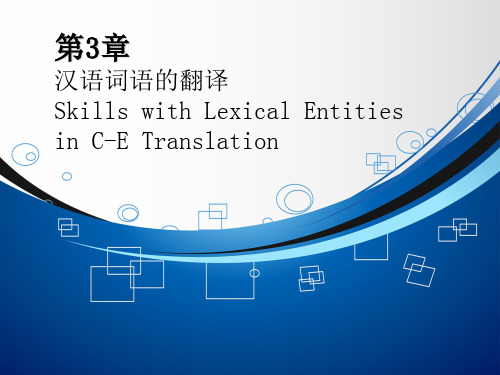
A Hired Wife
by Rou Shi
“So you’ve been seduced by the witch!” she would cry. “You should take good care of your old carcase.” The young woman overheard these abusive remarks time and again. After that, whenever she saw the scholar return home, she always tried to avoid him if his wife was not present. But even in the presence of his wife, the young woman considered it necessary to keep herself in the background. She had to do all this naturally so that it would not be noticed by outsiders, for otherwise the wife would get angry and blame her for purposely discrediting her in public. As time went on, the scholar’s wife even made the young woman do the work of a maid-servant. Once the young woman decided to wash the elderly woman’s clothes.
翻译方法3

译文
1. 为热烈欢迎专家,准备工作 工作已经做好。 工作 2. 在我们的合同中还存在着种种 种种尖锐的 种种 问题。 3. 最近,美国人一直不断地 一直不断地从城市向郊 一直不断地 区迁移。 4. 他的傲慢态度 态度使谁也不喜欢他。 态度
5. 他们谈到通货膨胀、失业、环境污染 等问题。 等问题 6. 这样,他在身心两方面 两方面都成长起来了。 两方面 7. 他两手蒙着脸,一屁股 一屁股坐了下去。 一屁股 8. 他吃点东西 东西,喝点酒,因为他疲惫不 东西 酒 堪了。
9. 直到今天母亲还坚持说, 她当时 当时以为 当时 我只是开开玩笑罢了。 10. 斯蒂芬看起来比他实际的年龄要老一 些,因为他曾经历过很艰苦的生活。 曾 过 11. 这也纯粹是一派胡言。 派 12. 你最好在下午以前瞧一下我的上衣, 下 看是否要熨一下。
(2)根据句法上的需要进行增 词
1. 增补原文回答句中的省略部分 Rebecca: “What! Don’t you love him?” Amelia: “Yes, of course, I do.” 丽贝卡:“怎么?你不爱他?” 艾米丽:“我当然爱他 爱他。” 爱他
2. 增补原文中省略的动词 Reading makes a full man; conference a ready man; writing an exact man. 读书使人充实,讨论使人 使人机智,写作使人 使人准确。 使人 使人 We don’t retreat. We never have and never will. 我们不后退,我们从没有后退过 后退过,将来也绝不 后退过 后退。 后退
翻译常用技巧
1.增词法
增词法就是在翻译时按意义上、修辞上 和句法上的需要增加一些词来更忠实通 顺地表达原文的思想内容。
翻译技巧3_增译法
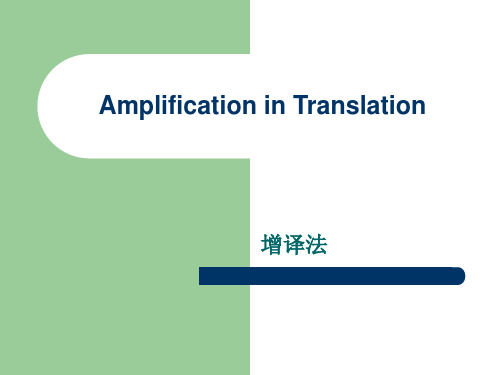
1. Like most wildlife,deer reproduce,grow, and store fat in the summer and fall when there is plenty of nutritious food available. 与大多数野生动物一样,鹿在营养丰富、食物 充足的夏秋两季,繁殖、生长储存脂肪。
1. 4 增加副词
有些动词根据原文的上下文可以增加适当的副 词,以确切表示原意。 1)As he sat down and began talking, words poured out. 他一坐下来就讲开了,滔滔不绝地讲个没完。
2)The crowds mmplification
1.1 增加动词 1.2 增加名词 1.3 增加概括词 1.4 增加副词 1.5 增加量词 1.6 增加表达复数的词 1.7 增加表达时态的词
1. 1 增加动词
根据意义上的需要,可在名词前后
增加动词使其意思明确,通顺自然。 例: concert→听音乐会; match→观看比赛; party→参加聚会; speech→发表讲话; funeral→出席葬礼,等等。
1. Lexical Amplification(从词汇上考虑的增 词) 2. Syntactical Amplification (从句法结构上 考虑的增词) 3. Cultural Amplification (从文化上考虑的增 词) 4. Rhetorical Amplification (从修辞上考虑)
② He is a complicated man---moody, mercurial, with a melancholy streak. 他是一个性格复杂的人——喜怒无常,反复 多变,有些忧郁寡欢。
翻译技巧3--词序调整法-分译和译--被动语态翻译
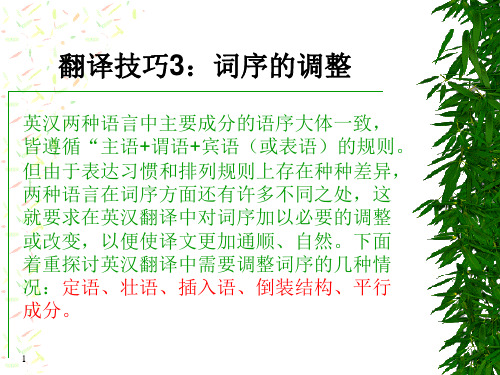
Exercise 1. He treats his sick wife poorly. 他待他有病的妻子不好。 2. Appearances are deceptive. 3.His refusal is not final. 外貌是靠不住的。
他的拒绝并非不可改变。
翻译技巧3: 翻译技ቤተ መጻሕፍቲ ባይዱ :词序的调整
英汉两种语言中主要成分的语序大体一致, 皆遵循“主语+谓语+宾语(或表语)的规则。 但由于表达习惯和排列规则上存在种种差异, 两种语言在词序方面还有许多不同之处,这 就要求在英汉翻译中对词序加以必要的调整 或改变,以便使译文更加通顺、自然。下面 着重探讨英汉翻译中需要调整词序的几种情 况:定语、壮语、插入语、倒装结构、平行 成分。
并列成分的词序调整 英语中并列成分的词序一般按照逻辑上的轻重、前后、 因果或部分-整体的顺序安排,而汉语通常将较大、较 强、较突出的成分前置。
elementary and secondary schools 中小学 heal the wounded and rescue the dying 救死扶伤 food, clothing, shelter and transportation 衣食住行
I have read your articles, but I expect to meet an older man. 我读过你的文章,但没料想你这样年轻。
1、肯定译作否定 I regret to learn that you have failed in the examination. 得知你未能通过考试,深表遗憾。 She missed the point of his joke. 她没有听懂他讲的笑话。 On Sunday Jim idles away his time. 星期天吉姆无所事事。 You may safely say so. 你这样说错不了。
翻译技巧3 增词

Adding verbs
• •
•
•
•
•
e.g. There were no speeches, no foreign diplomats, no “ordinary Chinese” with paper flags and flowers. — 没有发表讲话,没有各国外交官到场,也没有 “中国群众”挥舞纸旗和花束的场面。 e.g. After the banquets, the concerts, and the table tennis exhibitions, he would work on the drafting of the final communiqué. — 参加完宴会,出席过音乐会,观看了乒乓球表演 赛之后,他还得起草最后公报。 e.g. I’m really busy this morning: 2 classes, a meeting, and an interview. — 我今天上午的确很忙,要上两节课,开一个会, 还要接受一个采访。
Adding words which indicate the textual / social context
•
•
•
•
•
e.g. In April, there was the “ping” heard around the world. In July, the ping “ponged”. 如只照原文译出“四月份,全世界听到乒的一 声;七月里,这乒声乓了一下。”读者肯定不 知所云。根据中美建交的背景知识,把这段外 交史话译为: — 四月里,全世界听到中国乒的一声把球打 了出去;到了七月,美国乓的一声把球打了回 来。 e.g. Mao and Zhou learned that Nixon had the desire for a visit. — 毛泽东和周恩来获悉尼克松有访华的念头。
英汉互译技巧 3

英汉句式翻译—转换法(英→ 汉)
2. 成分转换 c. 宾语 主语或谓语
➢Light beams can carry more information than radio signals because light has a much higher frequency than radio waves.
英汉词汇翻译—转换法(英→ 汉)
1. 词类转换 a. 名词 副词
➢The new mayor earned some appreciation by the courtesy of coming to visit the city poor.
➢ 新市长礼貌性地前来看望城市贫民,获得了他们的一些好 感。
➢ 据说,他当选总统后不久,他的顾问们就建议降低税收, 扩大政府开支。
➢Steven was eloquent and elegant, but soft. ➢ 史蒂夫有口才、有风度,但很软弱。 ➢All peace-loving people demand the complete
prohibition and thorough destruction of nuclear weapons. ➢ 一切爱好和平的人都要求全面禁止核武器,彻底销毁核
➢ 各国社会制度的不同,不应妨碍彼此接近和相互合作。 ➢The application of electronic computers makes for a
tremendous rise in labor productivity. ➢ 使用电子计算机可以大大提高劳动生产率。
英汉词汇翻译—转换法(英→ 汉)
文言文翻译技巧三篇

[译文]将军擒曹操,应该在今天。
5. 用适当的词语换古文中的虚数。
例15. 知己知彼,百战不殆。《谋攻》
[译文]知道自己和敌军的实际情况,打多少次仗也不会失败。
四. 补
1. 名词活用为动词,就应补出相应成分。
例16. 苟入狱,不问罪之有无,必械手足。《狱中杂记》
[译文]即使不被斩首,去边地戍守而死的至少有十分之六七。
五. 删
1. 删去偏义复词中做为陪衬的词。
例22. 便可白公姥,及时相遣归。《孔雀东南飞》
[译文]你可以告诉婆婆,尽早地把我休回娘家。
2. 删去同义连用的实词或虚词中的一个词,少量的关联词语、结构助词(包括发语词、“之”、“是”等)。
直译就是字字落实。即:原文字字在译文中有着落,译文字字在原文中有根据。直译时主要应运用替、扩、留、补、删、调六字法。
例如:原句: 十年 春, 齐 师 伐 我。
│ │ │ │ │ │
译句:鲁庄公十年 春天,齐国的 军队 攻打 我们鲁国
①替:替换。就是用现代词语替换古代词语。如上文例句中的伐译为攻打,师译为军队 。
[译文]但从古以来的地图、文书,都没有记载。
2. 用现代汉。《桃花源记》
[译文]村中听说有这样一个人,都来问讯。
例11. 时墨者东郭先生将北适中山以干仕。《中山狼传》
[译文]这时,墨家学派东郭先生往北到中山国去求官。
例23. 山有小口,仿佛若有光。《桃花源记》
[译文]山上有一个小口,里面好像有光亮。
例24. 吾既已言之王矣。《公输》
[译文]我已经对楚王说过了。
此外,为保证译文准确,翻译时还要根据上下文语境甚至其它外围信息(出处、标题、注解)进行推断和印证,译完后还要将译文与原文仔细核对,以免出错。
09英汉翻译-3翻译技巧-转换词类精简版

英语中加后缀-er, -or 的名词,在句中并不表身份和职业,而 是含有较强的动作意义,往往可译为动词。
But as he (Abraham Lincoln) grew older he studied law in his spare time and became a lawyer. He was a good speaker and student of political philosophy.
保护某些稀有动物的生存问题,进来已引起了世 界范围的广泛注意。
They taught us the value of a dollar, took us to church, made us mind.
他们教导我们要珍惜每一块美元,带我们上教堂做 礼拜,还教导我们要听话。
The pace felt comfortable, so I decided to stay where I was; why bother concentrating on pace when she was such a nice pacesetter for me?
With unemployment high, the dollar low and the stork market in distress, the economy will be the President’s sternest trial.
昨日,由四川外语学院和联合某网站举办的 “2011Chinglish(中式英语)大发现”活动颁奖典礼 在川外举行,参加活动的上百名大学生共找出200多 处“洋茬”,这些“洋茬”主要集中在公共场所、景 区和服务机构三大区域。
英译汉翻译技巧及方法3

学生感到, 英语最困难的地方是它的习惯用法。
3. 宾语从句
3.1 普通句型
以从属连词、连接代词或介词引起的宾语从句汉译时,词序 一般不变。如:
If you do not mind, I will turn off the heating. 如果你不介意,我就把暖气关上了。
Though he was defeated in the election, he became famous for his fiery speeches against slavery.
虽然他竞选失败了,却以其反对蓄奴制度的激烈演说 而出了名。
他和副总统尼克松谈过话,副总统来自他保证,凡是能够 做到的都将竭尽全力去做。
2. 主语从句
2.1 “It+被动语态+that”句型
这种句型通常要译成汉语里的主动句,并增译出“大 家”“我们” “有人” “人们”等泛指性的主语。该 译法的特点保留了原文句子结构的前后顺序,即:先 主句,后从句。有时也可译为“据……”的句型。如:
• It is reported that the Summit Meeting will be held in December.
据报道,这个峰会将在12月举行。
2.2 “It +谓语(表语)+that”句型
这样的主语从句句型可处理为: (1) 先把主句的谓语或 表语部分译成独立语,然后顺译出从句;(2) 颠倒原文 句子结构,先译出从句,再译出主句。如:
我让你自己判断,这件事该不该做。
翻译技巧(3)增词法与重复法

⑷省译代词
英语中常常每句都有主语。根据汉语习惯, 前面如果出现一个主语,后句如果仍为同一 主语,就不必重复出现,所以,用来代替句 子中曾出现过的某一名词的人称代词或指示 代词that或these等,有的可省略不译。泛指 的人称代词作主语也常可省译。作定语用的 物主代词,往往可省译。
3. Water can be decomposed by energy, a current of electricity. 水可以用能量来分解, 所谓能量也就是电流。
4. Whoever violates the disciplines should be criticized. 谁违犯了纪律, 谁就应该受到批评。
Then the whole course of my life might have been different.
如果真是那样的话,我的生命路程也许是 另一番景象。(虚拟语气)
Had we known it in time, we would have prevented the accident.
same way as liquid acts. 气体受热时所发生的变化与液体完全一样。
在实践中,动词省译还见于下列两种情况: •某些系动词,如be, become, get等,如以形
容词或介词短语作表语时,这类动词常可省 译。
根据语法需要增词英语和汉语在语法方面差异很大比如英语有数的变化有时态语态语气变化有情态的变化我们常称为三态一气而汉语这样的变化很少如时态只用着了过就解决了
增减译
增译法(Amplification)
英译汉时的增词情况
根据词义或修辞需要增词 A professor of mine once said: 教过我的一位教授曾说过:…
七、翻译技巧(3)增词法与重复法
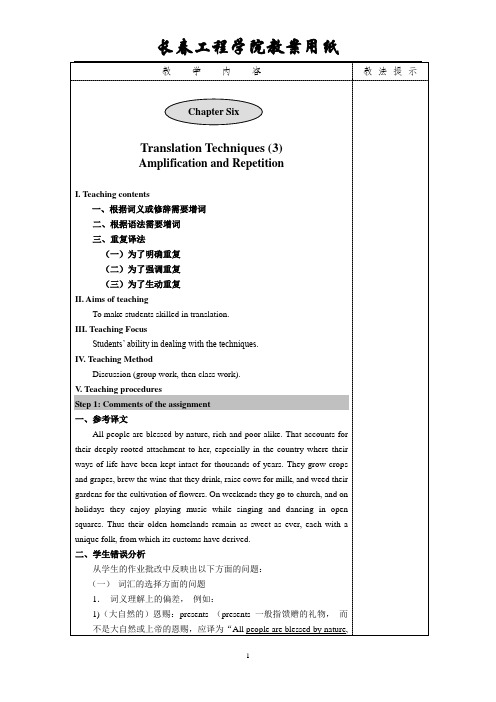
2
长春工程学院教案用纸
1. 逐字翻译, 画蛇添足。例如: [例 1] 在周末去教堂祈祷和做礼拜, 在节日到广场拉琴、跳 舞和唱歌; 误译:On weekends they go to church to pray and do religious services, in holidays, they go to the square to play musical instruments, dance and sing; 改译:On weekends they go to church, and on holidays they enjoy playing music while singing and dancing in open squares. [例 2] 往日的田园依旧是今日温馨家园。 误译:Those fields in the past/of yesterday are still cozy homelands at present/nowadays/of today. 改译:Thus their olden homelands remain as sweet as ever…( “现 在” 用现在时态体现即可。曾经、往日等用过去时态表示。 ) [例 3] 上学读书:go to school to study (go to school) 2. 重复不当, 不符合英语表达习惯。 [例] 所以人们对于大自然大全都一致并深深地依赖着。 尤其是在 乡间, 上千年来人们一直以不变的方式生活着。 原译:So people all deeply depend on nature. Especially in the countryside, people keep the unchangeable way of lives for thousands of years. 改译: That accounts for their deep-rooted attachment to her, especially in the country where their ways of life have been kept intact for thousands of years. 分析: 分析 此处学生把 people 重复了两遍, 很不自然。因为汉语里的 名词可以不厌其烦地重复,而英语中,一个刚刚提到的名词在相邻 的句子中通常是不能重复的。 3. 断句不当,割裂语篇。 [例] 大自然对人的恩赐, 无论贫富, 一律平等。 原译 1:Nature always distributes its resources to human beings. And every man gets equally from it. 原译 2:The gifts bestowed by nature are equally distributed among mankind. No matter one is rich or poor, he receives the same from the nature. 改译:All people are blessed by nature, rich or poor alike. 改进措施: 改进措施 增大练习力度, 尤其是汉译英的练习力度, 使学生能够更 好地驾驭两种语言,做好翻译工作。 Step 2 Amplification in translation (增词译法). 翻译时为了尽可能使译文的意义、语气、语态等切合原文,常常要
英汉翻译--3翻译技巧-重复与避免重复
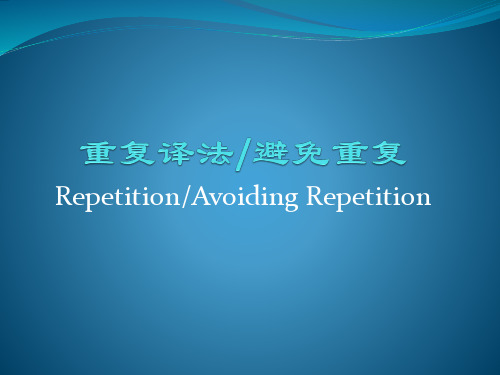
A thousand years will pass and the guilt of Germany will not be erased.--- Hans Frank Governor-General of Poland
千年易逝, 德国的罪孽难消。
——驻波兰总督汉斯•弗朗克
Your son or your father or your wife or your teacher or your boss might be a good friend of yours.
东方不亮西方亮,黑了南方有北方。
Everything is good when new, but friends when old.
东西是新的好,朋友是老的真。 物莫如新,友莫如故。
二、省去表示条件的连词
If winter comes, can spring be far behind? 冬天来了, 春天还会远吗?
一. 省去物主代词 Put your hat on your head. 把帽子戴上。
In my childhood I learned a great deal about Russia.
童年时,我就听到许多关于俄国的事情。
He put his hands into his pockets, shrugged his shoulders and went his way.
一个国家的自然资源十分丰富,出口一些资源 是不足为奇的。
Even if you go there, there wouldn‘t be any result.
你去了也是白去。
What could marriage mean if we did not feel ourselves capable of love?
翻译技巧-3

4. 转换为汉语的副词 (1) 形容词转换为副词 形容词所修饰的名词如果转译为动词则形容词要相应转译为副词。如: 例 30:He whispere匆匆地跟母亲小声道别。 例 31:They can speak good English. 译文:他们英语讲得很好。 例 32:The electronic dictionary is a fairly recent development. 译文:电子词典是最近才发展起来的。 (2) 名词转换为副
译文:这台新机器的效率比旧的要高得多。 例 15:This room is 7 meters
long, 5 meters wide and 3 meters high. 译文:这房间的长度是 7 米,宽度是 5 米,高度是 3 米。 (3) 副词转换为名词 一些由名词派生的副词在翻译的过程中经常转译为名词,如: 例 16:The figure of deaths was officially announced two days later. 译文:两天后官方宣布了死亡的人数。 例 17:He is physically weak but mentally sound. 译文:他身体虽弱,但心智健全。 例 18:Leaders are emotionally and intellectually oriented to the future, not wedded to the past. 译文:领导者在感情上和理智上都是面向未来的,而不是沉溺于过去。 3.转换成汉语的形容词 (1) 名词转换为形容词 通常转译为形容词的名词,大多是由形容词词根派生的名词,如: 例 19:The security and warmth of this room are wonderful. 译文:这个房间既安全又暖和,非常好。 例 20:I found great difficulty in solving this problem. 译文:我发现这个问题很难解决。 例 21:We are fully aware of the necessity in introducing new schemes. 译文:我们清楚地认识到,引进新的机制是十分必要的。 例 22:The performance was quite a success. 译文:演出非常成功。 例 23:I recognized the absurdity of dealing with them through intermediaries. 译文:我认识到,通过中间人跟他们打交道是很愚蠢的。 有些情况下, 为了使译文自然通顺, 也可以灵活地把英语中其他名词转译为汉语的形容词。 例如: 例 24:They said my story was a yawn. 译文:他们说我讲的故事很乏味。 例 25:He is a perfect stranger in the city. 译文:他对这座城市完全陌生。 例 26:That fellow is a typical fool. 译文:那个家伙笨得出奇。 (2) 副词转换为形容词 在翻译的过程中, 若副词所修饰的动词或形容词转译成名词, 则相应的副词也就要转译成形容词, 如: 例 27:I was deeply impressed by their hospitality. 译文:他们的热情好客给我留下了深刻的印象。 动词 “impress”转译为汉语中的名词“印象”时, 修饰“impress”的副词“deeply”也就相应 转译成汉语的形容词“深刻的”。类似的例子还有: 例 28:The flood was closely related to the heavy rain in the upper reaches of the river. 译文:洪水与河流上游的大雨有密切的关系。 例 29:It is demonstrated that gases are perfectly elastic. 译文:已经证实,气体具有理想的弹性。
翻译技巧3

翻译技巧3翻译技巧3 省略法省略法:指原文中有些词在译文中不译出来,因为译文中虽无其词而已有其意,或者在译文中是不言而喻的。
应遵循的原则:减词不减意一、从语法角度进行省略1.1 冠词的省略当冠词不表达具体的词义,而只是为了满足语法对用词造句形式上的要求时,这种冠词经常省略不译。
例: A camel is much inferior to an elephant in strength.骆驼的力量远不及大象。
1.2 代词的省略例1: Whether the laws are good or bad, they cannot complain, they cannot question, they cannot suggest changes.无论法律是否公正,他们无法抱怨、(……)无法质疑、(……)无法建议修改。
例2: But it’s the way I am, and try as I might, I haven’t been able to change it.但我就是这个脾气,(……)虽然几经努力,(……)却未能改变过来。
泛指的英语人称代词作主语时,即使是作第一个主语,译文中往往也可以省略。
We live and learn. (……)活到老,学到老。
物主代词的省略He broke his leg skiing. 他滑雪时摔断了腿。
反身代词的省略How do atoms arrange themselves in a solid?原子在固体中是如何排列(……)的?1.3 it的省略非人称代词it的省略非人称代词it在句中作主语时实际上是个虚词,并不指代上下文中具体的事物,一般用于表示自然现象、时间、距离、环境及一般情况等。
汉译时,常将这一非人称代词it省略,作为无主句。
例:Outside it was pitch dark and it was raining cats and dogs.外面一团漆黑,大雨倾盆。
英语翻译技巧Translation skill 3

bining the best genes in one plant is a long and difficult process, especially as traditional plant breeding has been limited to artificially crossing plants within the same species or with closely related species to bring different genes together. 集最佳基因于一种植物, 集最佳基因于一种植物,是一个漫长而又艰难的 过程——特别是传统的作物育种方法,这种方法 特别是传统的作物育种方法, 过程 特别是传统的作物育种方法 仅局限于同种或相近物种之间的人工杂交而将不 同的基因组合在一起。 同的基因组合在一起。
科技文体翻译
一. 科技翻译中的逻辑思辨 科技翻译中的逻辑思辨有很多形式, 科技翻译中的逻辑思辨有很多形式,但其中一个 极为重要的形式即对原文善作条分缕析, 极为重要的形式即对原文善作条分缕析,令其译 文层次分明,读者乐于接受,易于接受。 文层次分明,读者乐于接受,易于接受。清晰的 逻辑思辨既是理解科技文章的关键, 逻辑思辨既是理解科技文章的关键,也是令译文 通晓、流畅的保证。 通晓、流畅的保证。
二.长句在科技文章英译中的运用 长句在科技文章英译中的运用 英译重形合,注重句子形式及结构完整, 英译重形合,注重句子形式及结构完整,句中 多用语言形式手段连接, 多用语言形式手段连接,因而英译句子一般较 仿佛是“大树参天,枝叶横生” 长,仿佛是“大树参天,枝叶横生”。而汉语 采用意合法造句,很少甚至不用衔接手段, 采用意合法造句,很少甚至不用衔接手段,注 重隐性连贯,以神统形,所以汉语的句子结构 重隐性连贯,以神统形, 被喻作“碧波万顷,层层推进” 被喻作“碧波万顷,层层推进”。英汉互译时 应注意英语长句与汉语流水式短句的适当转换。 应注意英语长句与汉语流水式短句的适当转换。
翻译技巧3
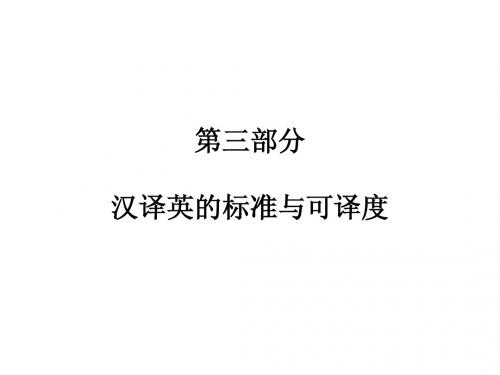
•
•
• •
(四) 风格层次 原文:我不善于讲话,也不习惯发表演说,我一生 就没做过教师。 译文I:I’m not good at talking, and I’m not used to giving lectures. I’ve never done any teaching either. [1]
•
翻译标准既有规范性又有灵活性,译者应根据 不同类型、不同性质的内容严格而又灵活地掌握。 例如: 从小儿三灾八难,花的银子也照样打出你这么 个银人儿来。(《红搂梦》) You’ve had one trouble after another since you were a boy, the money we’ve spent on you would make a silver statue bigger than you.
• • • • •
(七) 心理转换 原文:这是一篇八股文。 译文I:This is a bagu essay. [0.2] 译文II:This is an eight-legged essay. [0.3] 译文III:This is a stereotyped writing. [0.5]
•
• •
• • • • • • •
(1) 概念意义(conceptual meaning); (2) 内涵意义 (connotative meaning); (3) 社会意义(social meaning); (4) 情感意义(affective meaning); (5) 反映意义(reflected meaning); (6) 搭配意义(collocative meaning); (7) 主题意义(thematic meaning)。
英文翻译技巧3
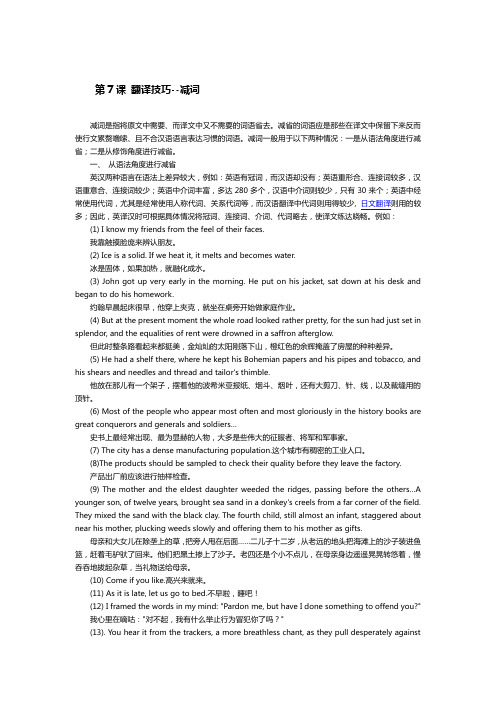
第7课翻译技巧--减词减词是指将原文中需要、而译文中又不需要的词语省去。
减省的词语应是那些在译文中保留下来反而使行文累赘噜嗦、且不合汉语语言表达习惯的词语。
减词一般用于以下两种情况:一是从语法角度进行减省;二是从修饰角度进行减省。
一、从语法角度进行减省英汉两种语言在语法上差异较大,例如:英语有冠词,而汉语却没有;英语重形合、连接词较多,汉语重意合、连接词较少;英语中介词丰富,多达280多个,汉语中介词则较少,只有30来个;英语中经常使用代词,尤其是经常使用人称代词、关系代词等,而汉语翻译中代词则用得较少,日文翻译则用的较多;因此,英译汉时可根据具体情况将冠词、连接词、介词、代词略去,使译文练达晓畅。
例如:(1) I know my friends from the feel of their faces.我靠触摸脸庞来辨认朋友。
(2) Ice is a solid. If we heat it, it melts and becomes water.冰是固体,如果加热,就融化成水。
(3) John got up very early in the morning. He put on his jacket, sat down at his desk and began to do his homework.约翰早晨起床很早,他穿上夹克,就坐在桌旁开始做家庭作业。
(4) But at the present moment the whole road looked rather pretty, for the sun had just set in splendor, and the equalities of rent were drowned in a saffron afterglow.但此时整条路看起来都挺美,金灿灿的太阳刚落下山,橙红色的余辉掩盖了房屋的种种差异。
(5) He had a shelf there, where he kept his Bohemian papers and his pipes and tobacco, and his shears and needles and thread and tailor's thimble.他放在那儿有一个架子,摆着他的波希米亚报纸、烟斗、烟叶,还有大剪刀、针、线,以及裁缝用的顶针。
翻译技巧3 词类的转译
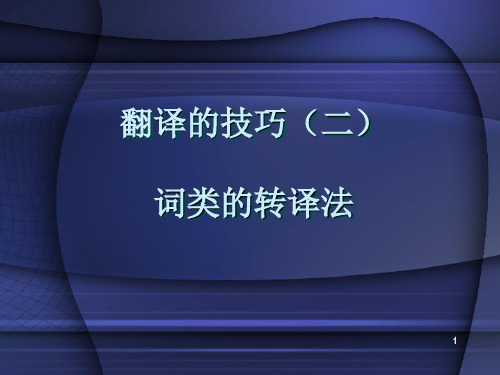
2)此外,根据情况还有些形容词 可以译成名词。
例:Stevenson was eloquent and elegant——but soft. 史蒂文森有口才、有风度,但很软 弱。
37
练习:
Lack of trust is very destructive in a relationship.
• 同一类词在不同的上下文中,
或由不同的译者翻译,完全可能 转化成不同的词类,但这并不意 味着词类转换可以随心所欲,必 须忠实于原文意义。
11
常见的词类转换类型:
一、转换成汉语动词 二、转换成汉语名词
三、转换成汉语形容词
四、转换成汉语副词
12
一、转换成汉语动词
1、名词转译成动词
2、介词与介词短语转译成动词
20
例:I am afraid I can’t teach you swimming. I think my little brother is a better teacher than I . 恐怕我不能教你游泳。我想我的小弟 弟比我教得更好。
21
练习:
Talking with his son, the old man was the forgiver of the young man's past wrong doings.
3、形容词转译成动词
4、副词转译成动词
13
一、转换成汉语动词
1、名词转译成动词 英语中许多含有动作意义的名词 和由动词派生的名词以及其他一些 名词经常可以转译成汉语的动词。
14
1)具有动作含义的名词转译成动词。 The remembrance of these will add zest to his life. ×对于这些事情的回想将会增添他生活 的乐趣。 【译文】 回想起这些事情,使他的生活 增添了乐趣。
- 1、下载文档前请自行甄别文档内容的完整性,平台不提供额外的编辑、内容补充、找答案等附加服务。
- 2、"仅部分预览"的文档,不可在线预览部分如存在完整性等问题,可反馈申请退款(可完整预览的文档不适用该条件!)。
- 3、如文档侵犯您的权益,请联系客服反馈,我们会尽快为您处理(人工客服工作时间:9:00-18:30)。
Conversion of Parts of Speech(2)词性转换法(2)在英汉翻译实践中,尽管其他词性转换不如转换为动词那样普遍,但也是一种解决翻译问题的有效手段。
下面介绍一些在英汉翻译过程中其他常见的词性转换情况。
2.转换为汉语的名词(1)动词转换为名词由名词词根派生的动词,或由名词转用的动词,其词义用汉语中的动词直接表达往往比较困难,通常转译为汉语中的名词。
如:例1:What characterizes his work is a lack of attention to detail.译文:他工作的特点是不注重细节。
例2:To those small children, their teachers personified absolute power.译文:对这些小孩子来说,他们的老师就是绝对权威的化身。
例3:All the people concerned would be motivated to work together.译文:所有相关人员都会受到鼓励,一起工作。
例4:His wife has done everything to mother him.译文:他妻子竭尽全力,象母亲一样照顾他。
例5:The reform aims at increasing the work efficiency of the whole department.译文:这次改革的目的是提高整个部门的工作效率。
有一些动词尽管不是名词派生或转化而来,但在翻译过程中为了表达自然通顺也可以转换为名词,如:例6:He objected that the plan is not practical.译文:他反对的理由是这项计划不切实际。
例7:A young man, who looked and talked like a student, attracted my attention.译文:一个言谈举止都像学生的年轻人引起了我的注意。
(2)形容词转换为名词英语中用定冠词“the”加上某些形容词来表示一类人或事物。
这样的形容词通常要转译为汉语中的名词。
如:例8:They tried their best to help the sick and the wounded.译文:他们尽最大的努力帮助病人和伤员。
例9:All the countries, whether rich or poor, should pay more attention to environmental protection.译文:不论是穷国还是富国,都应该更加注意保护环境。
例10:Under certain conditions, the harmful can be transformed into the beneficial. 译文:在特定的条件下,坏事可以变成好事。
另外,一些由名词派生的形容词在翻译过程中也常可转译为汉语中的名词,例如:例11:Official Moscow is going to object to this proposal.译文:莫斯科官方准备反对这项提议。
例12:In fission processes the fission fragments are very radioactive.译文:在核裂变过程中,裂变碎片的放射性很强。
有一些形容词在具体的上下文语境中难以直接译为汉语中的形容词,也可以考虑转译为汉语中的名词。
如:例13:He was elegant and eloquent, but soft.译文:他有风度,有口才,但是很软弱。
例14:This new machine is much more efficient than the old one.译文:这台新机器的效率比旧的要高得多。
例15:This room is 7 meters long, 5 meters wide and 3 meters high.译文:这房间的长度是7米,宽度是5米,高度是3米。
(3)副词转换为名词一些由名词派生的副词在翻译的过程中经常转译为名词,如:例16:The figure of deaths was officially announced two days later.译文:两天后官方宣布了死亡的人数。
例17:He is physically weak but mentally sound.译文:他身体虽弱,但心智健全。
例18:Leaders are emotionally and intellectually oriented to the future, not wedded to the past.译文:领导者在感情上和理智上都是面向未来的,而不是沉溺于过去。
3.转换成汉语的形容词(1)名词转换为形容词通常转译为形容词的名词,大多是由形容词词根派生的名词,如:例19:The security and warmth of this room are wonderful.译文:这个房间既安全又暖和,非常好。
例20:I found great difficulty in solving this problem.译文:我发现这个问题很难解决。
例21:We are fully aware of the necessity in introducing new schemes.译文:我们清楚地认识到,引进新的机制是十分必要的。
例22:The performance was quite a success.译文:演出非常成功。
例23:I recognized the absurdity of dealing with them through intermediaries.译文:我认识到,通过中间人跟他们打交道是很愚蠢的。
有些情况下,为了使译文自然通顺,也可以灵活地把英语中其他名词转译为汉语的形容词。
例如:例24:They said my story was a yawn.译文:他们说我讲的故事很乏味。
例25:He is a perfect stranger in the city.译文:他对这座城市完全陌生。
例26:That fellow is a typical fool.译文:那个家伙笨得出奇。
(2)副词转换为形容词在翻译的过程中,若副词所修饰的动词或形容词转译成名词,则相应的副词也就要转译成形容词,如:例27:I was deeply impressed by their hospitality.译文:他们的热情好客给我留下了深刻的印象。
动词“impre ss”转译为汉语中的名词“印象”时,修饰“impress”的副词“deeply”也就相应转译成汉语的形容词“深刻的”。
类似的例子还有:例28:The flood was closely related to the heavy rain in the upper reaches of the river. 译文:洪水与河流上游的大雨有密切的关系。
例29:It is demonstrated that gases are perfectly elastic.译文:已经证实,气体具有理想的弹性。
4. 转换为汉语的副词(1)形容词转换为副词形容词所修饰的名词如果转译为动词则形容词要相应转译为副词。
如:例30:He whispered a hurried goodbye to his mother.译文:他匆匆地跟母亲小声道别。
例31:They can speak good English.译文:他们英语讲得很好。
例32:The electronic dictionary is a fairly recent development.译文:电子词典是最近才发展起来的。
(2) 名词转换为副词因汉语的某一些固定表达习惯,英语的名词有些情况下要转译为相应的汉语的副词,如:例33:It's my honor to inform you that you have won the first prize.译文:我很荣幸地通知您荣获了一等奖。
例34:The United States was unhappy with the slowness of Japan to advance free trade. 译文:美国对日本缓慢地推进自由贸易感到不满。
词性转译是翻译实践中一种非常有效的技巧。
尽管对一些常见的词性转译进行了分类,但实际上词性的转换非常灵活。
具体转译为什么词,一定要视上下文而定。
我们应当确立一个观念,即词的翻译是灵活的,不要受到词类的太多限制。
但无论转译为何种类型的词都应当遵守翻译的最基本原则:一方面要忠实于原文的意思,另一方面要表达流畅自然,符合汉语的习惯。
Exercises:1.将下列句子译成汉语,并注意划线词的词性转换:(1) Formality has always characterized their relationship.(2) Our age is witnessing a profound political change.(3) He was efficient in his work.(4) Everyday experience shows us that heavy objects are more stable than light ones.(5) The paper said editorially that such behavior is against the spirit of the Central Committee of our Party.(6) The image must be dimensionally correct.(7) They believe in the correctness of the key.(8) This new device is chiefly featured by its convenience of operation.(9) "Yes", he said, with a slow nod or two.(10) I had the fortune to meet the president.2.将下列短文译为汉语:The year 2002 sees that the start of one of the most exciting missions in almost half a century of space exploration, as the 2001 Mars Odyssey space probe begins it first journey to uncover the secrets of Mars.The 2001 Mars Odyssey is not the first probe to visit Mars. Since 1964 the US National Aeronautics and Space Administration (NASA) has sent several probes to orbit and land on the planet, and all have made significant observations. However, it is hoped that 2001 Mars Odyssey will make the most thorough exploration yet, possibly ever marking our first ever discovery of extraterrestrial life.The Mars Odyssey mission began on April 7, 2001. Because Earth and Mars have verydifferent orbits around the Sun, the timing of the launch was crucial, and was carefully planned to take place at the moment when the journey between the two planets would be at its shortest. In January 2002, three months after going into orbit around Mars, the Odyssey embarked on its ultimate mission---- a three-year-program to search for life. The name "2001 Mars Odyssey" is a tribute to science fiction author, Arthur Clark, and his most celebrated work 2001: A Space Odyssey, a story of contact with extraterrestrial intelligence.1.(1) 他们之间的关系有一个特点,就是非常拘于礼节。
